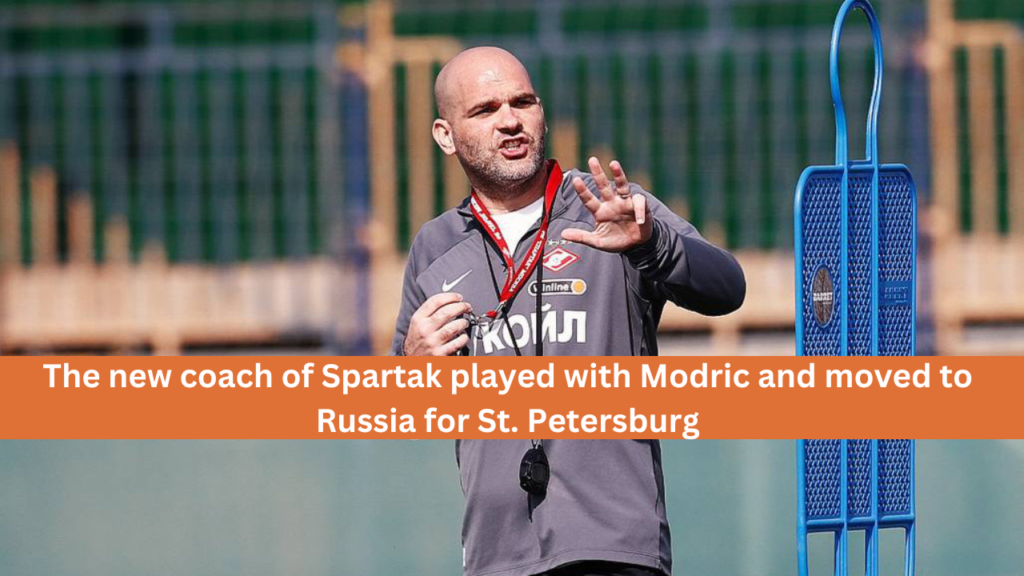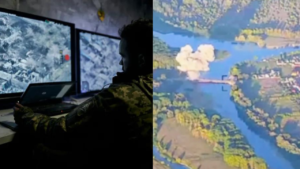Now Vladimir Slishkovich will lead the Moscow team to the Russian Cup match with Zenit

On April 17, Spartak will play with Zenit in the return match of the semi-final of the RPL Path of the Russian Cup. The game will take place in St. Petersburg, will begin at 19:30 and will be shown on the Match TV channel. Before the cup match, Spartak dismissed coach Guillermo Abascal. At the Gazprom Arena, the Moscow team will be led in an acting capacity by the Spaniard’s former assistant, Vladimir Slishkovich. “Vedomosti” Sport” talk about this 41-year-old Bosnian, his coaching journey and his famous father, who was the idol of Zinedine Zidane himself.
What is Sliskovich’s father known for and why Vladimir did not reveal himself as a player
Vladimir is the son of former Yugoslav national team midfielder Blaz Sliskovic, who earned the nickname “Maradona of the Balkans” for his brilliant play as a playmaker. Sliskovic Sr. was recognized as the best football player of 1985 in Yugoslavia, and played abroad from the mid-1980s to the mid-1990s for Marseille, Lens, Mulhouse and Rennes in France and Pescara in Italy.
Blaj was famous for his good dribbling and ability to take set pieces well. True, he was unable to fully develop himself in the Yugoslav national team, for which he played only 26 matches and scored three goals. This was influenced, among other things, by injuries, due to which he missed, in particular, the 1982 World Cup.
While playing for Marseille, Sliskovic Sr. was one of Zidane’s favorite football players, a native of this city and the future winner of the Ballon d’Or. Zine dine himself spoke about his idols of youth: “Today the idols of children are Lionel Messi and Cristiano Ronaldo, and for me and my generation the idols were the great football players of that time Enzo Frances coli, Blaz Sliskovic and Jean-Pierre Papin… I liked watching Sliskovic. Indeed, he was a wonderful player. He scored amazing goals, even from a direct corner kick.”
Blaj retired from football in 1998 and became a coach. For 23 years he worked with various club and national teams. He coached the national team of Bosnia and Herzegovina, as well as local teams Zrinjski, Brotne, Široki Brijeg and Železničar. He headed Hajduk and Hrvatski Dragovoljac in Croatia, Tirana in Albania, Uniru in Romania, Al-Ansar in Saudi Arabia, Qingdao Zhongneng in China and Kitchi in Hong Kong. With Sliskovic Sr., Zrinjski won the Bosnia and Herzegovina championship twice. Blaž was twice recognized as coach of the year in this country, and in 2004 he was even named person of the year.
Sliskovic Jr. was born in the Bosnian city of Mostar and began his career at the local Zrinjski. In 2000, then 17-year-old Vladimir signed his first professional contract and spent three seasons at this club. In 2003, his teammate at Zrinjski became the current Real Madrid midfielder Luka Modric, who was also just starting his professional career and was sent on loan to Bosnia and Herzegovina by the Croatian Dinamo from Zagreb.
“That summer, Luka Modric and several other guys from Dynamo arrived,” Sliskovic recalled . “We started training together, trained with each other for two months. And then I went to Zheleznichar. Why did you change Zrinski to a competitor? Back then it wasn’t a real rivalry, since Železničar was considered by far the best club in the country and was even close to qualifying for the Champions League.”
In Željezničar, Sliskovic met with another star of Balkan football, Edin Dzeko, the record holder of the Bosnia and Herzegovina national team for the number of matches (134) and goals scored (65), a finalist of the last Champions League as part of Inter Milan. At that time, the striker was just taking his first steps in adult football. But Sliskovich failed to get promoted in Železničar. Vladimir stayed at the Sarajevo club for only one season. The reasons are health problems that ruined his entire career as a football player.
“I have chronic inflammation of my right kidney,” explained Sliskovich. “That year, I was in treatment more often than I was on the field. I tried to return, but despite the three-year contract, after the first season I told the management of Zhelezničar: “Thank you for everything, but you see that I can’t even conduct a month of stable training.” We parted peacefully, I returned to Zrinjski and continued my treatment.”
Vladimir actually missed two years, and then made his last attempt to return to football. In the 2006/07 season he trained at Zrinjski under the guidance of his father. He even took part in one international match in Israel, coming on as a substitute against Maccabi Petah Tikva in the Intertoto Cup. But the old problem remained – the pain in the kidneys did not go away. As a result, in 2008, at the age of 25, the midfielder, after talking with his father, decided to hang up his boots.
Slishkovic Jr. clearly understood what he would do after his career. Even in his last season at Zrinjski, as a player, he began coaching at the club’s academy, combining two jobs. Vladimir worked with the youth of the club from Mostar for the first four years.
In 2011, Sliskovic went to Saudi Arabia and China for a year, where he assisted his father at the Al-Ansar and Qingdao Zhongneng clubs. After returning to Bosnia and Herzegovina, Vladimir spent another three years at the Zrinjski Academy, and at the same time served as an assistant coach in the U-16 youth team.
How Sliskovich’s coaching career developed and why he moved to live in Russia
In 2016, Sliskovich Jr. was considered for the post of head coach of the Kenyan national team. It was reported that the Bosnian’s profile was liked by the head of the local federation, Nick Medway, who wanted to open the way for Kenyan footballers to Balkan clubs. But for some reason the appointment did not take place. Vladimir began his independent coaching career only a year later, when he took charge of the Chinese Hunan Billows, where he stayed for only six months.
In 2017, Vladimir returned to his homeland and continued to work as an assistant coach for the Bosnia and Herzegovina U-16 national team. He could have gone with his father to Hong Kong when Sliskovic Sr. took over Kitchi, but instead went to France, where he trained at Saint-Etienne. Vladimir received a Pro license, which is necessary for a coach to be able to lead high-level teams, and his thesis was devoted to the functioning of this French club.
Sliskovic was helped to organize an internship in France by the former Yugoslav footballer, goalkeeper Ivan Curkovic, who played for Saint-Etienne for many years. Čurković was friends with Vladimir’s grandfather and Blaž’s father, who was also a professional player.
“He played with my late grandfather in Velezh, was family friends with my grandparents, with my father, and has known me since birth,” Vladimir said about Churkovich. – When I asked him to help me with Saint-Etienne, he organized everything so much that I was greeted as if I were Platini! Although many of my colleagues have a problem finding a club where they will intern.”
After leaving the youth national team of Bosnia and Herzegovina in the summer of 2020 and until his appointment to Spartak in June 2022, Sliskovic did not work anywhere officially. An unexpected, at first glance, turn took place in his life. Vladimir moved to Russia and settled in St. Petersburg. The thing is that the Bosnian’s wife is Russian, originally from this city. For the sake of his family, the coach decided to move to our country.
“I’ve been in Russia for two years now since my son went to school,” Sliskovich admitted in an interview shortly before his appointment to Spartak. – Although my wife is Russian, it was my initiative for him to go to school in St. Petersburg. Every time we came here, I really liked it here. This is a special city, fantastic. One of the three or four most beautiful in Europe. It doesn’t matter where to wait for work – in Mostar or St. Petersburg.”
While living in St. Petersburg, Vladimir communicated with the ex-captain of Zenit, Croatian Dejan Lovren. But the circumstances turned out that the Bosnian’s job was eventually given to the principal rival of the St. Petersburg team “Spartak”. Sliskovich was brought to the Moscow club by the then sports director of Spartak, Luca Cattani, but he was also familiar with Abascal.
“My acquaintance with Abaskal has been going on for many years,” said Sliskovich after his appointment to Spartak. – We had some kind of cooperation, but not on the field. Rather, it was communication related to football, back when he was working in Italy. He invited me to Spartak because I lived in Russia and knew the club and the league. I am very grateful to Luca Cattani, the president and the club itself for their trust.”
Nevertheless, the relationship between Sliskovich and Abascal, apparently, was not cloudless. After the resignation of the head coach , it became known that the Spaniard and the Bosnian often had conflicts, since Vladimir did not agree with Guillermo’s decisions related to the team’s play. Abascal’s compatriots, who were part of his headquarters, left Spartak with him, but Sliskovich remained and will lead the Muscovites to the cup match at the Gazprom Arena.
St. Petersburg is turning into a special city for Sliskovich in terms of the development of his coaching career in Russia. Vladimir already replaced Abascal in March of this year, when, due to the Spaniard’s disqualification, he led Spartak in an away match with Zenit. Then Abaskal did not go to the stadium, but went to Moscow, but Spartak, with the Bosnian on the sideline, gave an unexpectedly good game and took points from the reigning champion. The game ended in a stalemate.
Many noticed that during that meeting, Sliskovich’s right-hand man was Spartak captain Georgiy Dzhikia, who lost his place in the starting lineup under Abascal. The defender of the Russian national team suggested to the Bosnian some nuances related to the actions of the players on the field. At the end of the match, Vladimir spoke very warmly about Dzhikia: “George is the captain. They are not made, but born. Georgiy has leadership qualities; he tries to drive the team even when he is not on the field. The rest of the guys also helped. Georgiy is an emotional person and supported the team. Did what I had to do. We are proud to have such a player.”
In 2024, Dzhikia took part in only one game against Fakel, coming on as a substitute 20 minutes before the end. Perhaps under Sliskovic the captain will return to the starting lineup. Meanwhile, information has emerged that the Bosnian may remain the coach of Spartak until the end of the current season – much will depend on the results of the team’s upcoming matches.









